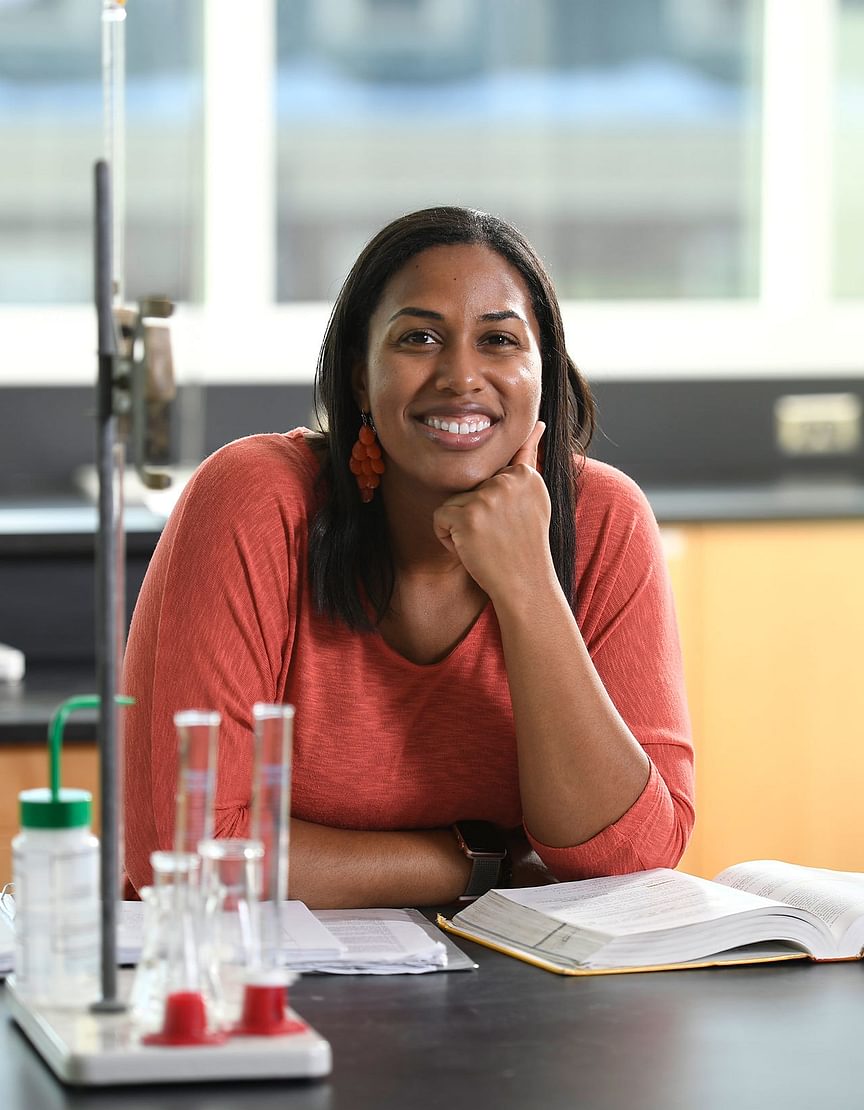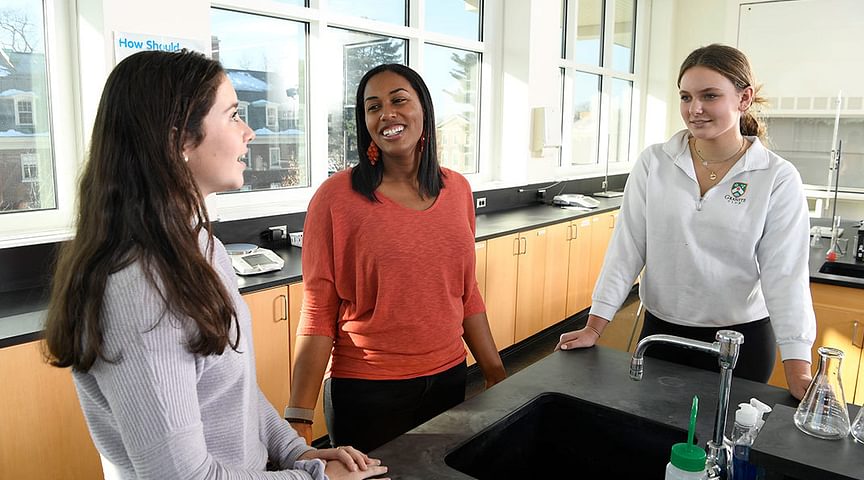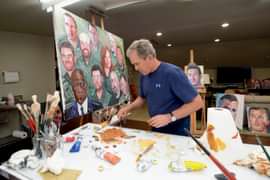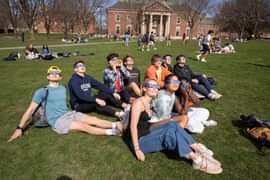
March 21, 2018
The study of change
Sheena Hilton ’05 talks chemistry, residential life, and her Atlanta Hawks dream jobby Kristin Bair O’Keeffe
When she was a student at Phillips Academy, Sheena Hilton ’05 and her friends used to say, “I don’t understand how teachers can be here for so long year in and year out. I’ll never be a lifer.” Now in her 10th year at PA, the chemistry instructor and Flagstaff cluster dean says, “Never say never.”
Having experienced being “the only one” at many times in her career, Hilton says she wants to use her role as an educator to mentor girls and underrepresented students and encourage their growth in the STEM fields.
Give a quick rundown of your time at PA.
After I graduated in 2005, I went to Yale and earned a bachelor’s degree in chemistry. I came back to PA and was a teaching fellow in chemistry during the 2009-2010 school year; I loved it. I taught at Greenwich Academy in Connecticut for a year and then returned to PA as a chemistry instructor in 2011. Over the course of three summers, I earned a master of arts in chemistry from Bucknell. I left again in 2014 to get a master’s degree in food science at Cornell. I returned to PA again in 2016. I just can’t stay away!
How does the fact that you were once a PA student inform your current role?
Having been a student gives me an appreciation for different moments of the year. I still remember walking into the chapel my senior year for the opening of All-School Meeting. We were silent; we all had our hands up in the air. Nobody knew what was going on because usually it’s so loud. Nobody said a word until [then Head of School] Barbara Chase said, “the Class of 2005.” Then we exploded. I also remember getting my Abbot rose on the day of graduation and thinking, “I can’t believe I’m here. This is real.”
I came from a decent distance away [suburb of Atlanta] so I know what it’s like to be away from home. I want to make sure that as many kids as I can reach know that they have an adult on campus who cares about them and whom they can trust.
What inspired you to become a teacher?
I wanted to be a doctor since the age of 7. All through Andover and most of college, I was planning for this. When I began the medical school application process, I started thinking about what I would write in my personal statement. I loved science. I loved sharing science with others. I wanted to mentor young people. I thought, “This doesn’t have anything to do with health care. It sounds more like education.”
Which PA teachers inspired you?
I had Leslie Ballard for Chem-300 and Temba Maqubela for Chem-580 and organic chemistry. The two of them made me love chemistry. Sue Buckwalter was another mentor.
I think of PA like a family member. Sometimes I get upset with it, but it’s still family. It’s in me. It feels like home.
”Why are you so passionate about mentoring girls and underrepresented students?
As an African-American woman in the sciences, you get used to being “the only” or one of the few in a space such as a lab or a college science department. This means that you also have to work harder to make connections with people, and it can be harder to establish mentoring relationships.
Temba was a mentor and a motivating force for me, particularly in the sciences. I didn’t see a lot of people throughout my education who looked like me, so in the sciences and in general I want to be someone the kids look at and say, “OK, I can do this. I can get there.”
Why do more women need to move toward STEM careers?
We need diversity of thought in STEM. People often think of humanities as being creative and of science and math as being cut and dry, but in actuality you have to be creative and think outside of the box to solve real-world problems with science. The answers to current problems aren’t out there in a textbook somewhere—current scientists have to discover them, and the more diverse group you have working to solve these problems, the better the results.
Define chemistry.
It’s the study of changes. This is funny because I generally don’t like change in my life, but I like to study change!
Why chemistry?
I have a mind that likes to problem solve and chemistry presents some interesting problems. Plus you get to do fun things in the lab.
What are some of your most favorite and fun experiments?
One of my favorite demos is called the “gummy bear sacrifice.” I did this for a talent show in college. You drop a gummy bear into an oxygen-rich environment and combustion occurs. It releases a lot of energy in the form of light so you get to see some beautiful colors.
What was your earliest experience with chemistry?
In either elementary or middle school, I was taking off nail polish using nail polish remover, which is acetone. I poured it into a Styrofoam cup and put it on my parents’ table. Then I said, “You know what? If this spills, it’s going to be problematic.” Sure enough, that’s what happened; it ate through the lacquer on the table. So I had a hunch and I was right.
Why did you choose to get a master’s degree in food science?
When I was a teaching fellow, I wanted to be the house counselor I would have wanted as a PA student. Part of that was food. I started to bake and loved it. I had already done my master’s in chemistry, so I said, “Let me learn something else.” My love of baking steered me in the direction of food science. Food affects everybody, and the science of food is something everyone should know a little bit about.

What was the last thing you baked for students?
Double-deckers (brownie on the bottom and chocolate chip cookie on top) and oatmeal chocolate chip cookies!
Chemistry requires creativity, risk taking, and a willingness to fail. How do you nurture these characteristics in your students?
Right now, I teach Chem-580. This is one of our most challenging classes, and it’s often the first science class in which students experience failure. They’ve come through Bio 100 and done fairly well. They’ve come through Chem-300 and done fairly well. It’s been smooth sailing, and then suddenly students are like, “What? I don’t understand something?”
One of my classes is very chatty, and I cannot finish a sentence before they start asking, “But what about this? And this?” I say, “Patience. Just be comfortable being uncomfortable.”
For most labs in Chem-580, students don’t get a procedure. I give them a short blurb [a description of what they’re trying to solve] and the materials. They have to figure it out. They work together. We encourage collaboration, because that’s how science works, but they have to struggle and take risks. Sometimes they say, “I don’t understand this.” And I say, “I know. That’s the point.”
You recently began as Flagstaff cluster dean. What attracted you to this role?
I love working with kids and supporting the whole student—it’s the same reason I love house counseling. While I love chemistry, what I love most about working at a boarding school is that I get to work with kids inside and outside of the classroom. You really get to know the students this way. As a cluster dean, I get to support many more students than I did when I was a house counselor.
What are the responsibilities of a cluster dean?
Basically you are in charge of your cluster, which functions as a smaller PA community. I work with house counselors and day-student advisors when kids are struggling. I handle discipline, talk with parents when concerns arise, deal with permissions, and host weekly cluster munches. I provide support to both students and faculty in the cluster, and work to foster community among Flagstaff students and faculty. I want to get to know as many of my 221 students as possible.
As a cluster dean, you are no longer working as a house counselor. Do you miss this aspect of direct contact with students?
Yes! I love the regular, often silly interactions with the girls in the dorm. As cluster dean, I often meet with students when things are not going well—which can be a great learning experience. It is a real privilege to work with students during those difficult moments. But I still miss the fact that with house counseling you see the good, the bad, and everything in between.
Toughest moment as a teacher?
Grading. Not the individual assignments, but final grades. Temba used to say, “I’m a teacher, not a grader.” I wish I could say that all the time, but in the end I have to do grades. When a kid has worked really, really hard and they’ve earned X grade and I have to give them X grade, it can feel pretty terrible. I know that the grade isn’t everything, but they don’t know that at the time. Hopefully they’ll learn it.
Most triumphant moment as a teacher?
When a kid gets it. At the end of last year, it was so satisfying to see some of my students who struggled the most on tests and assessments excel on their paper and presentation. To hear them explain complex chemical principles and techniques—that was like, “Yes!”
I’ve worked with some kids who have really struggled, some who even had to go on leave. When they get to graduation and they’re crying happy tears, nothing beats that.
What profession other than teaching would you like to try?
It’s hard to imagine not working with high school students, but if the Atlanta Hawks called me up and said Dominique Wilkins is retiring and we need another commentator, I’d say, “Sign me up! I’m hopping on the plane now!”
Kristin Bair O’Keeffe, former editor of Andover magazine, is a freelance writer, teacher, and novelist. Follow her on Twitter and Instagram @kbairokeeffe.
Other Stories

Former president-turned-artist George W. Bush ’64 honors his favorite teacher




